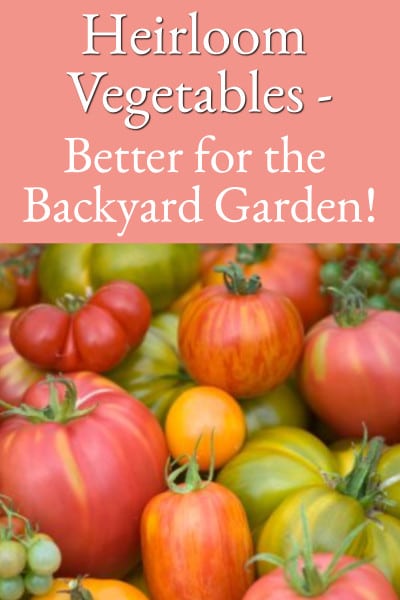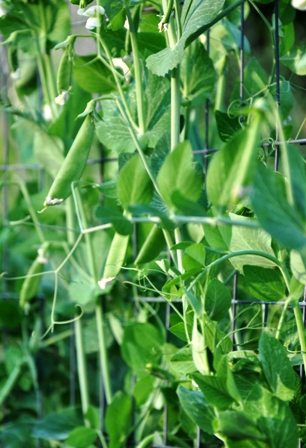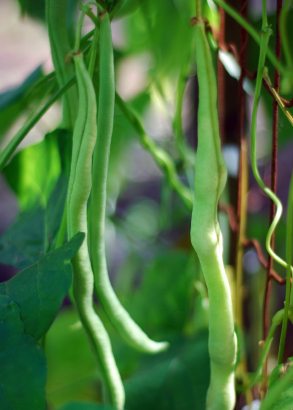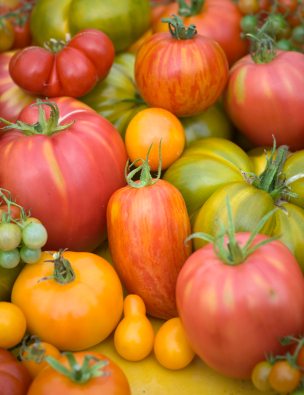
Heirloom vegetables are the old-fashioned, open-pollinated varieties that breed true from year-to-year. This leads to some definite benefits for the backyard gardener.
Why Heirloom Vegetables Are Better:
Heirloom Seeds Cost Less
There are two ways that heirloom seeds save money; 1) they cost less than their hybrid counterparts and 2) you can save the seeds from year-to-year, thereby cutting seed costs.
Hybrid seeds are the result of deliberately crossing different varieties (think labor-intensive), so they’re typically more expensive than open-pollinated (heirloom) seeds. Also, because they’re crossed, seeds from hybrids do not breed true and can’t be saved from year-to-year.
Seed companies promote hybrids because they’re more profitable for them; but, heirlooms are generally more economical for home gardens.
Heirloom Vegetables Adapt
Our ancestors saved their vegetable seeds by necessity, selecting only outstanding plants for next year’s seeds. These seeds were carefully preserved, traded with friends, and passed to the next generation.
This resulted in plants slowly developing resistance to local diseases and insects, and also gradually becoming well adapted to local climate and soil conditions. By following this same strategy, we can develop strains for our own gardens that become more resilient every year.

Sugar Snap Peas
Growing From Transplants
Even if you’re not interested in growing plants from seed, there are still benefits to using heirlooms. And, heirloom transplants are becoming increasingly available at garden centers, as home gardeners rediscover their advantages:
Heirloom Vegetables Ripen Gradually
Most hybrids are bred for commercial applications, which means uniformity and simultaneous ripening are promoted. Growers want to harvest fields just one time.
Conversely, heirlooms ripen over long periods, perfect for gardeners wanting to spread fresh produce and preservation chores over the entire season.
Heirloom Vegetables Taste Much Better
The most exciting advantage of heirloom vegetables is their flavor. The hybrid vegetable varieties were developed for mechanical harvesting and mass transit, meaning tough skins and solid flesh, not flavor.
Heirlooms, on the other hand, have been selected for rich flavor and tenderness for decades. You can count on these vegetables to be delicious.

Fortex Heirloom Green Bean – Fantastic Taste & Prolific
Heirloom Vegetables Are More Nutritious
When developing the hybrid varieties, the breeders also focused on getting higher yields, which for vegetables, means selecting the highest carbohydrate levels. But this often results in lower nutrient levels.
For gardeners growing a few plants, high yields don’t make much difference; but nutrient-dense vegetables do.
Which Heirloom Vegetables Vegetables to Start With
Vegetables that are mainly self-pollinating; like beans, eggplant, lettuce, peas, peanuts, peppers, and tomatoes, are the easiest to save for seed. Planting different varieties of these at least ten feet apart usually prevents cross-pollination.
Vegetables that are pollinated by wind or insects need to be isolated or separated by large distances to prevent cross-pollination. These vegetables include beets, broccoli, cabbage, carrots, cauliflower, corn, melons, onions, pumpkins, radishes, spinach, squash, and Swiss chard. The easiest way to ensure purity for these, in a small garden, is to grow only one variety at a time.

Heirloom Tomatoes
Heirloom Varieties for Your Garden
We can get a jump on heirlooms adapted to our gardens by selecting varieties that are popular locally. Check at the local feed & seed supply or farmers’ market. Ask what varieties are popular and do best in the area, and then start with some that appeal to you. That’s exactly what I do each year, research new (to me) heirloom varieties for my garden!
Here’s a list of heirloom varieties to try recommended by homesteaders: Heirloom Vegetable Variety Roundup
Links for Heirloom Seeds
Lots of heirlooms can also be found online today, there are a few sources listed below:
VictorySeeds.com – sells open-pollinated, non-hybrid, non-genetically modified (GMO) heirlooms
RareSeeds.com – sells open-pollinated seeds: pure, natural & non-GMO heirlooms
SeedsTrust.com – sells mostly non-hybrid (open-pollinated) varieties, many organic, all non-GMO
SeedSaversExchange.com – a non-profit, member-supported organization that saves and sells heirloom seeds – permanently maintaining more than 25,000 endangered vegetable varieties
Sarah says
The question running through my head while reading was where can I get like real, heirloom seeds. Luckily, you posted the trustworthy vendors at the end. Thank you!
Lynn says
I would like to take a minute and thank you for all of the informative info that this website provides. Initially I was searching info on raising chickens when I came across the garden section. Thanks for all of the wonderful advise!!!!
Lesa says
Thanks Lynn! It’s encouraging to find that you find the information useful 🙂